File Info
| Exam | Nutanix Certified Professional-Cloud Integration-AWS V6.7 |
| Number | NCP-CI-AWS |
| File Name | Nutanix.NCP-CI-AWS.VCEplus.2024-10-31.55q.tqb |
| Size | 2 MB |
| Posted | Oct 31, 2024 |
| Download | Nutanix.NCP-CI-AWS.VCEplus.2024-10-31.55q.tqb |
How to open VCEX & EXAM Files?
Files with VCEX & EXAM extensions can be opened by ProfExam Simulator.
Coupon: MASTEREXAM
With discount: 20%
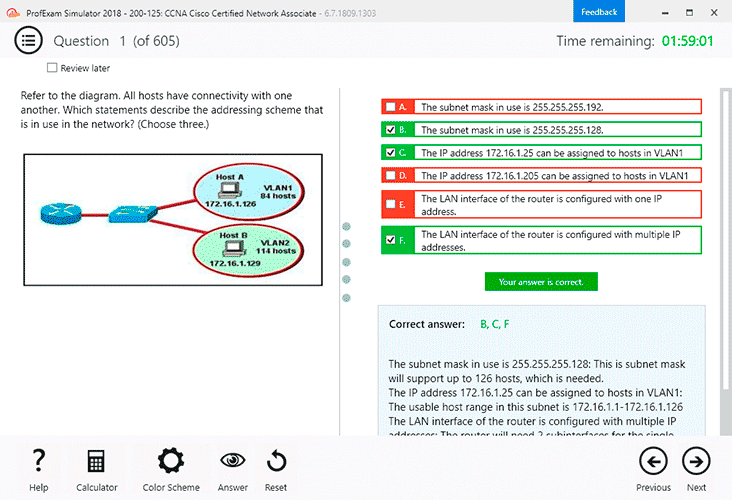
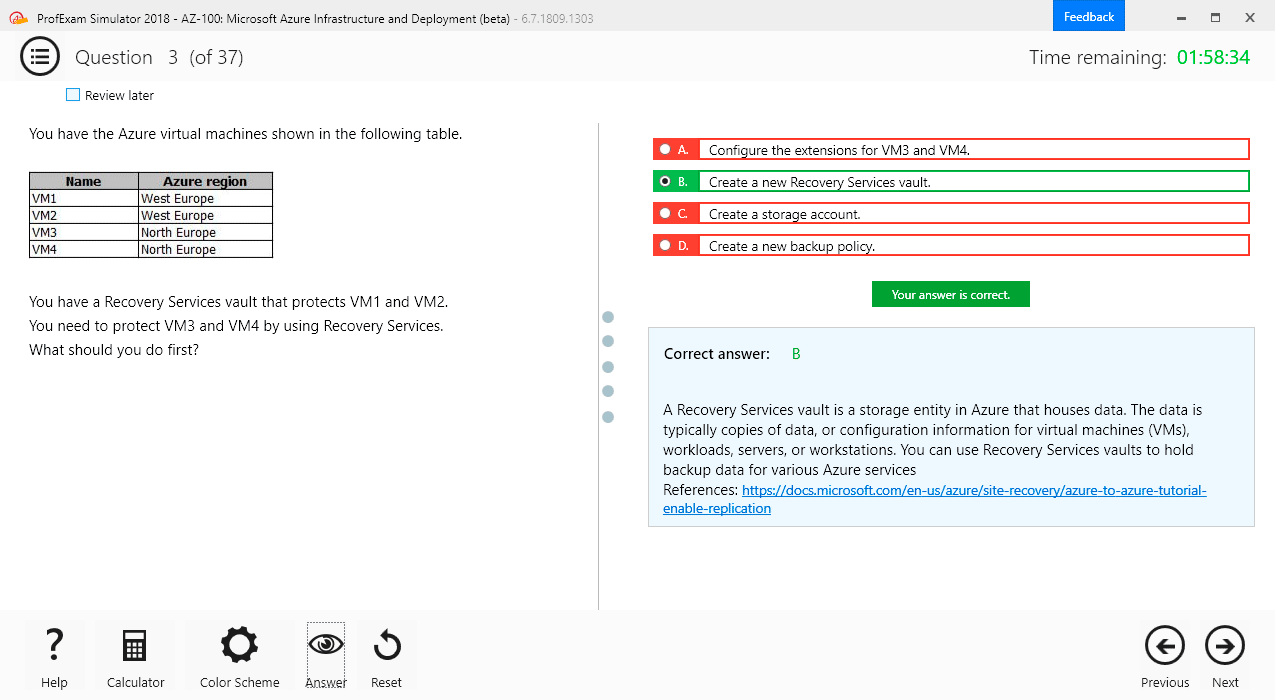
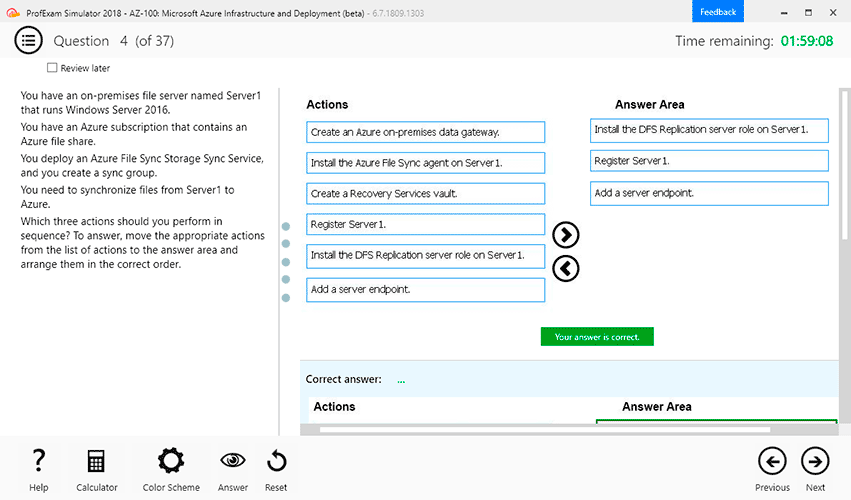
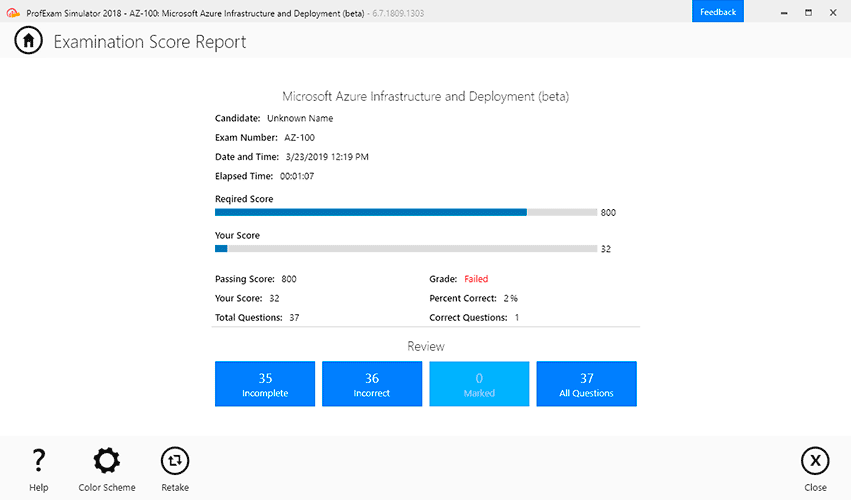
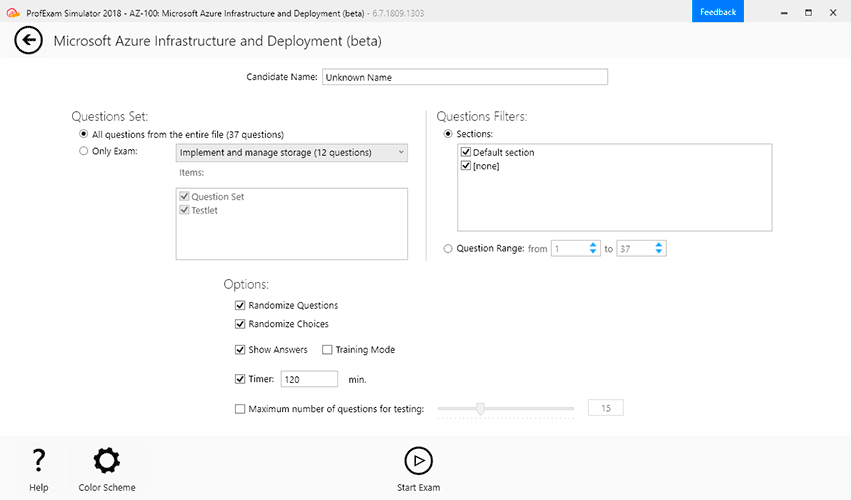
Demo Questions
Question 1
An administrator has been tasked with performing a test migrating from an NC2 environment to a Nutanix on-premises environment.
Where should the administrator perform this task?
- NC2 Prism Element
- NC2 Prism Central
- Nutanix Cloud Services Portal
- On-premises Prism Central
Correct answer: B
Explanation:
When performing a migration from an NC2 environment to a Nutanix on-premises environment, the task should be performed using the NC2 Prism Central. This is because NC2 Prism Central provides a centralized management interface that allows administrators to manage and migrate workloads between cloud and on-premises environments seamlessly.Nutanix Cloud Clusters (NC2) DocumentationNutanix Community Guide When performing a migration from an NC2 environment to a Nutanix on-premises environment, the task should be performed using the NC2 Prism Central. This is because NC2 Prism Central provides a centralized management interface that allows administrators to manage and migrate workloads between cloud and on-premises environments seamlessly.
Nutanix Cloud Clusters (NC2) Documentation
Nutanix Community Guide
Question 2

An administrator is attempting to deploy an NC2 cluster.
The cluster configuration is as follows:
- Name - Cluster-1
- Nodes of type i4i.metal
- Replication Factor 2
- Existing VPC resources
- VPC - 10.0.0.0/16
- Subnets:
- Bare metal hosts: 10.0.1.0/24
- User VMs:10.0.2.0/24
- Public: 10.0.3.0/24
During the deployment process, the administrator notices the following alert:

What should the administrator do to ensure the cluster deployment does not fail?
- Create a new VPC and modify the cluster configuration to use the new VPC.
- Check AWS VPC and subnet quotas for the cloud account.
- Ensure an outbound Internet connection exists from 10.0.1.0/24.
- Modify the administrator's RBAC permissions in the NC2 console.
Correct answer: C
Explanation:
The alert indicates a potential issue with the VPC/Subnet settings, preventing the cluster nodes from contacting Nutanix services.To resolve this, the administrator needs to ensure that the subnet 10.0.1.0/24, which is assigned for Bare metal hosts, has an outbound Internet connection.This connection is necessary for the cluster nodes to communicate with external Nutanix services for updates, license validation, and other essential operations.Verify that there are appropriate route tables and security group rules allowing outbound traffic to the Internet from the 10.0.1.0/24 subnet.Ensure that there is either an Internet Gateway (IGW) attached to the VPC or a NAT Gateway configured if using private subnets.Reference: Refer to the Nutanix documentation and AWS VPC configuration guides to ensure proper Internet connectivity and routing setups. The alert indicates a potential issue with the VPC/Subnet settings, preventing the cluster nodes from contacting Nutanix services.
To resolve this, the administrator needs to ensure that the subnet 10.0.1.0/24, which is assigned for Bare metal hosts, has an outbound Internet connection.
This connection is necessary for the cluster nodes to communicate with external Nutanix services for updates, license validation, and other essential operations.
Verify that there are appropriate route tables and security group rules allowing outbound traffic to the Internet from the 10.0.1.0/24 subnet.
Ensure that there is either an Internet Gateway (IGW) attached to the VPC or a NAT Gateway configured if using private subnets.
Reference: Refer to the Nutanix documentation and AWS VPC configuration guides to ensure proper Internet connectivity and routing setups.
Question 3
To manually create an AWS VPC with Public access to Prism Element for testing purposes, Which components must be created?
- VPC, Delegated Subnets, Route Tables, NAT Gateway, Internet Gateway, Load balancer
- VPC, Delegated Subnets, Route Tables, NAT Gateway, vNets, Load balancer
- VPC Subnets Route Tables NAT Gateway, Internet Gateway, Load balancer
- VPC Subnets Route subnets, Route Tables, NAT Gateway, Internet Gateway, VPN
Correct answer: A
Explanation:
To manually create an AWS VPC with Public access to Prism Element for testing purposes, the following components must be created:VPC: A Virtual Private Cloud to provide an isolated network for the resources.Delegated Subnets: Subnets within the VPC to segment the network and allocate IP ranges.Route Tables: To define routing rules for the subnets to ensure proper traffic flow.NAT Gateway: To enable instances in the private subnets to access the internet.Internet Gateway: To allow direct internet access to instances in the public subnets.Load Balancer: To distribute traffic across multiple instances for improved availability and redundancy.Reference: Refer to the AWS documentation on VPC creation and Nutanix documentation on network setup for Prism Element access. To manually create an AWS VPC with Public access to Prism Element for testing purposes, the following components must be created:
VPC: A Virtual Private Cloud to provide an isolated network for the resources.
Delegated Subnets: Subnets within the VPC to segment the network and allocate IP ranges.
Route Tables: To define routing rules for the subnets to ensure proper traffic flow.
NAT Gateway: To enable instances in the private subnets to access the internet.
Internet Gateway: To allow direct internet access to instances in the public subnets.
Load Balancer: To distribute traffic across multiple instances for improved availability and redundancy.
Reference: Refer to the AWS documentation on VPC creation and Nutanix documentation on network setup for Prism Element access.
Question 4
Which two features or services can an administrator ensure are protected by cluster protect within an NC2 environment? (Choose two.)
- Flow Network Security
- VM Templates
- Nutanix Files
- Virtual Machine Disks
Correct answer: CD
Explanation:
Within an NC2 environment, the Cluster Protect feature can ensure the protection of:Nutanix Files: This provides file services within the Nutanix ecosystem, and Cluster Protect can safeguard the data stored in Nutanix Files.Virtual Machine Disks: This ensures that the data stored on virtual machine disks is protected, providing backup and recovery options for the virtual machines running within the cluster.Nutanix Cloud Clusters on AWS AdministrationNutanix AOS 6.7 Documentation Within an NC2 environment, the Cluster Protect feature can ensure the protection of:
Nutanix Files: This provides file services within the Nutanix ecosystem, and Cluster Protect can safeguard the data stored in Nutanix Files.
Virtual Machine Disks: This ensures that the data stored on virtual machine disks is protected, providing backup and recovery options for the virtual machines running within the cluster.
Nutanix Cloud Clusters on AWS Administration
Nutanix AOS 6.7 Documentation
Question 5
An administrator is planning a new NC2 on AWS deployment. The workload VMs to be deployed on the new cluster have low storage and memory, but high CPU frequency (>3.0 GHz) requirements.
The administrate! has also been tasked with ensuring that the cluster nodes have the lowest number of CPU cores to reduce application licensing requirements.
Which node type will satisfy this new deployment?
- i3.metal
- zld.metal
- i4i.metal
- m5d.metal
Correct answer: A
Explanation:
For a new NC2 on AWS deployment where workload VMs have low storage and memory requirements but high CPU frequency (>3.0 GHz) requirements, and the goal is to minimize the number of CPU cores to reduce application licensing costs, the i3.metal instance type is the most suitable.i3.metal:High CPU Frequency: i3.metal instances offer high-frequency Intel Xeon processors (up to 3.1 GHz) which meet the high CPU frequency requirement.Low Storage and Memory: These instances come with a balanced amount of storage and memory, suitable for workloads with low requirements in these areas.Minimized CPU Cores: i3.metal instances have fewer CPU cores compared to other high-frequency instances like i4i.metal, making them ideal for minimizing application licensing costs.Other Instance Types:z1d.metal: While also offering high CPU frequency, these instances typically come with a higher core count and more memory, which may not be optimal for minimizing licensing costs.i4i.metal: Designed for I/O intensive applications with higher core counts.m5d.metal: Balanced instance type but with more cores and not as high CPU frequency as required.AWS EC2 Instance Types DocumentationNutanix Cloud Clusters on AWS Administration GuideNutanix Best Practices for Instance Selection For a new NC2 on AWS deployment where workload VMs have low storage and memory requirements but high CPU frequency (>3.0 GHz) requirements, and the goal is to minimize the number of CPU cores to reduce application licensing costs, the i3.metal instance type is the most suitable.
i3.metal:
High CPU Frequency: i3.metal instances offer high-frequency Intel Xeon processors (up to 3.1 GHz) which meet the high CPU frequency requirement.
Low Storage and Memory: These instances come with a balanced amount of storage and memory, suitable for workloads with low requirements in these areas.
Minimized CPU Cores: i3.metal instances have fewer CPU cores compared to other high-frequency instances like i4i.metal, making them ideal for minimizing application licensing costs.
Other Instance Types:
z1d.metal: While also offering high CPU frequency, these instances typically come with a higher core count and more memory, which may not be optimal for minimizing licensing costs.
i4i.metal: Designed for I/O intensive applications with higher core counts.
m5d.metal: Balanced instance type but with more cores and not as high CPU frequency as required.
AWS EC2 Instance Types Documentation
Nutanix Cloud Clusters on AWS Administration Guide
Nutanix Best Practices for Instance Selection
Question 6
An administrator seeks to ensure that the newly created NC2 organization named Finance can only deploy clusters into certain cloud regions.
What action should the administrator take to do this?
- Configure RBAC roles on the Finance NC2 organization to allow access to regions.
- Configure IAM permission in cloud accounts to restrict access to certain regions.
- Open a support ticket with Nutanix to whitelist the allowed regions for the Finance NC2 organization.
- Specify allowed regions when configuring a cloud account for the Finance NC2 organization.
Correct answer: D
Explanation:
To ensure that the newly created NC2 organization named Finance can only deploy clusters into certain cloud regions, the administrator should specify the allowed regions during the cloud account configuration.This action restricts the regions available for cluster deployment, ensuring compliance with organizational policies or regulatory requirements.The allowed regions can be set in the cloud account settings associated with the Finance NC2 organization, defining the geographical scope of operations.Reference: Refer to the Nutanix documentation on NC2 cloud account configuration and region restrictions. To ensure that the newly created NC2 organization named Finance can only deploy clusters into certain cloud regions, the administrator should specify the allowed regions during the cloud account configuration.
This action restricts the regions available for cluster deployment, ensuring compliance with organizational policies or regulatory requirements.
The allowed regions can be set in the cloud account settings associated with the Finance NC2 organization, defining the geographical scope of operations.
Reference: Refer to the Nutanix documentation on NC2 cloud account configuration and region restrictions.
Question 7
Which interface must be used to deploy NC2?
- Cloud Provider portal
- NC2 Tile within the my.nutanix.com portal
- Prism Central Dashboard
- Foundation running in a Cloud Virtual Machine
Correct answer: B
Explanation:
The NC2 Tile within the my.nutanix.com portal is the correct interface to deploy NC2. This portal provides an integrated and user-friendly interface specifically designed for deploying and managing Nutanix Clusters on AWS.NC2 Deployment Interface:NC2 Tile within the my.nutanix.com portal: This portal provides the necessary tools and options to deploy and manage NC2 clusters. It includes functionalities for setting up the clusters, configuring network settings, and managing resources.Advantages:User-Friendly Interface: Simplifies the deployment process with a guided setup.Integrated Tools: Provides access to all necessary tools for managing the deployment and monitoring of NC2 clusters.Nutanix Cloud Clusters on AWS Administration GuideNutanix my.nutanix.com Portal DocumentationNutanix Best Practices for Cluster Deployment The NC2 Tile within the my.nutanix.com portal is the correct interface to deploy NC2. This portal provides an integrated and user-friendly interface specifically designed for deploying and managing Nutanix Clusters on AWS.
NC2 Deployment Interface:
NC2 Tile within the my.nutanix.com portal: This portal provides the necessary tools and options to deploy and manage NC2 clusters. It includes functionalities for setting up the clusters, configuring network settings, and managing resources.
Advantages:
User-Friendly Interface: Simplifies the deployment process with a guided setup.
Integrated Tools: Provides access to all necessary tools for managing the deployment and monitoring of NC2 clusters.
Nutanix Cloud Clusters on AWS Administration Guide
Nutanix my.nutanix.com Portal Documentation
Nutanix Best Practices for Cluster Deployment
Question 8
Which entity should be contacted for AOS software supported related to NC2?
- Internal IT Operations team
- Nutanix
- Partner
- Public Cloud Vendor
Correct answer: B
Explanation:
For AOS software support related to NC2, the appropriate entity to contact is Nutanix. Nutanix provides comprehensive support for their software, including the Acropolis Operating System (AOS) used in NC2 deployments.Support Scope:Nutanix offers support for the deployment, configuration, and management of NC2 clusters, including any issues related to AOS software.This includes troubleshooting, updates, and technical assistance.Why Not Other Options:Internal IT Operations team: Typically handles internal issues but does not have the specialized knowledge or resources for AOS software support.Partner: May provide support but would ultimately escalate issues to Nutanix for software-specific concerns.Public Cloud Vendor: Manages infrastructure-related issues but does not provide support for Nutanix AOS software.Nutanix Support DocumentationNutanix Cloud Clusters on AWS Administration GuideNutanix Best Practices for AOS Support For AOS software support related to NC2, the appropriate entity to contact is Nutanix. Nutanix provides comprehensive support for their software, including the Acropolis Operating System (AOS) used in NC2 deployments.
Support Scope:
Nutanix offers support for the deployment, configuration, and management of NC2 clusters, including any issues related to AOS software.
This includes troubleshooting, updates, and technical assistance.
Why Not Other Options:
Internal IT Operations team: Typically handles internal issues but does not have the specialized knowledge or resources for AOS software support.
Partner: May provide support but would ultimately escalate issues to Nutanix for software-specific concerns.
Public Cloud Vendor: Manages infrastructure-related issues but does not provide support for Nutanix AOS software.
Nutanix Support Documentation
Nutanix Cloud Clusters on AWS Administration Guide
Nutanix Best Practices for AOS Support
Question 9
A company has purchased Nutanix AOS Pro licensing.
Which add-on products are available with this license tier in the AWS cluster deployment wizard?
- EUC
- Nus
- Self-Service and Cost Governance
- Files, Advanced Replication, and DARE
Correct answer: D
Explanation:
With the Nutanix AOS Pro licensing, several advanced features and add-on products become available. Specifically, in the AWS cluster deployment wizard, the following add-ons are available: Files:Nutanix Files provides a software-defined, scale-out file storage solution that simplifies the management and scaling of unstructured data.Advanced Replication:Advanced Replication features in Nutanix include synchronous and asynchronous replication capabilities, allowing for robust disaster recovery and data protection solutions.DARE (Data-At-Rest Encryption):DARE ensures that all data stored on Nutanix clusters is encrypted, providing a higher level of security for sensitive information.These features are included in the AOS Pro licensing tier, offering enhanced data management, protection, and security capabilities.Nutanix Licensing GuideNutanix Cloud Clusters on AWS Administration GuideNutanix Best Practices for Advanced Features With the Nutanix AOS Pro licensing, several advanced features and add-on products become available. Specifically, in the AWS cluster deployment wizard, the following add-ons are available:
Files:
Nutanix Files provides a software-defined, scale-out file storage solution that simplifies the management and scaling of unstructured data.
Advanced Replication:
Advanced Replication features in Nutanix include synchronous and asynchronous replication capabilities, allowing for robust disaster recovery and data protection solutions.
DARE (Data-At-Rest Encryption):
DARE ensures that all data stored on Nutanix clusters is encrypted, providing a higher level of security for sensitive information.
These features are included in the AOS Pro licensing tier, offering enhanced data management, protection, and security capabilities.
Nutanix Licensing Guide
Nutanix Cloud Clusters on AWS Administration Guide
Nutanix Best Practices for Advanced Features
Question 10
What is an available log module when configuring a syslog server in the Prism Central Admin Center?
- API Audit
- Prism
- Zookeeper
- Acropolis
Correct answer: D
Explanation:
When configuring a syslog server in the Prism Central Admin Center for Nutanix, one of the available log modules is Acropolis.The Acropolis module logs system events related to the Nutanix Acropolis operating system, which is critical for monitoring and auditing system activities and performance.Configuring syslog with the Acropolis module ensures that important events and issues related to the Acropolis environment are captured and can be forwarded to an external syslog server for centralized logging and analysis.Reference: Refer to the Nutanix documentation on Prism Central and syslog configuration for the full list of available log modules and detailed steps for configuration. When configuring a syslog server in the Prism Central Admin Center for Nutanix, one of the available log modules is Acropolis.
The Acropolis module logs system events related to the Nutanix Acropolis operating system, which is critical for monitoring and auditing system activities and performance.
Configuring syslog with the Acropolis module ensures that important events and issues related to the Acropolis environment are captured and can be forwarded to an external syslog server for centralized logging and analysis.
Reference: Refer to the Nutanix documentation on Prism Central and syslog configuration for the full list of available log modules and detailed steps for configuration.


